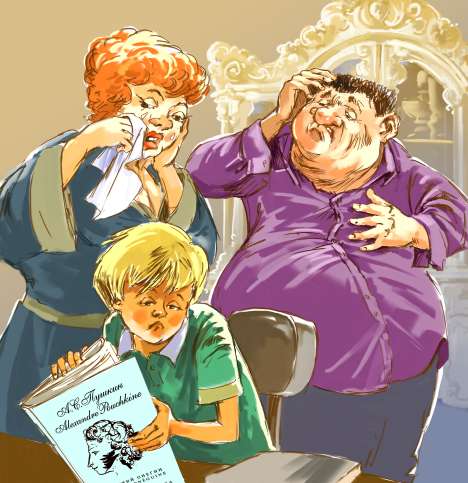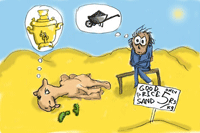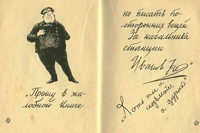What do you do if your child likes reading?


Drawing by Dmitriy Divin
For a start - what are the warning signs? Everyone knows the symptoms - the child doesn't play outside so much, he's getting better marks at school, he's taken to disappearing into his room, the bathroom, the toilet, with a book tucked under his arm. When asked what he's doing with this book, he'll look awkwardly down at his feet, and come up with some muttered explanation: "Toilet paper's run out", "I was using it to prop up the cupboard", "me and Petka were having a book fight..." It is especially worrying when children read books together, forming groups and discussing what they've been reading. And those who think this unfortunate habit is exclusive to boys would be wrong! Little girls are just as likely to start reading at this most young and innocent stage in their lives.
So what can you do if your child reads?
First of all, keep calm! Doctors have used various anonymous surveys to show that 99% of people at one time or another in their lives have spent time reading, and the other 1% have just erased the event from their memory. Children are insatiably curious creatures, so it is inevitable that sooner or later they will get the urge to pick up a book, and see what it is all about.
Secondly, don't scare the children! If you catch your child reading in his room – just pretend you haven't seen anything. Don't resort to scaring them off with threats from the middle ages; things like "you'll go blind", "you'll get paper-cuts", "your brain will deplete your vertebrae, and your cranium will get bigger and bigger", "your hands will be covered in calluoses from all the pages you've been turning". You can't deny that reading could potentially be bad for your eyesight, and paper can indeed cut your skin. But this is not the end of the world! It is perfectly normal for children to want to read. As a parent, it is your job to introduce the child to some other form of entertainment - sport, housework, computer games, and if worse comes to worst, try giving them beer (many would be forgiven for thinking this risky, but beer really does the job when it comes to distracting the child from books). You could show the child comic books - there aren't too many words there and plenty of pictures, and this is a good way of gradually weaning them off their dependency on the written word.
Thirdly, get specialist help. We recommend presenting your child with a work by Leo Tolstoy, Fedor Dostoevsky or Maxim Gorky. Heavy tomes of classical literature are one of the best tried-and-tested means of creating a healthy aversion to books in your child. But a specialist can also prescribe some sort of specialist literature.
Fourthly, simply have it out with the child. Tell him that you completely understand his interest in reading, say that you went through a stage like this yourself, and that he doesn't need to worry, sooner or later he'll find it within himself to kick this disgusting habit once and for all. Once you've got peace and understanding within the family, that's half the battle won.
Fifthly, remember that the road to recovery is long and bumpy, and that relapses are inevitable. If your son gets into the army, where he'll be deprived of computer and TV, or if your daughter argues with her boyfriend, for example, you need to be extra careful that they aren't tempted to pick up a book. It has even happened that people of more advanced years have suddenly become hooked on reading, especially those whose life is going through a rocky patch. But the sooner you start fighting the habit the higher the chances that your children will throw away their books and never be tempted to pick them up again.
All rights reserved by Rossiyskaya Gazeta.
Subscribe
to our newsletter!
Get the week's best stories straight to your inbox

